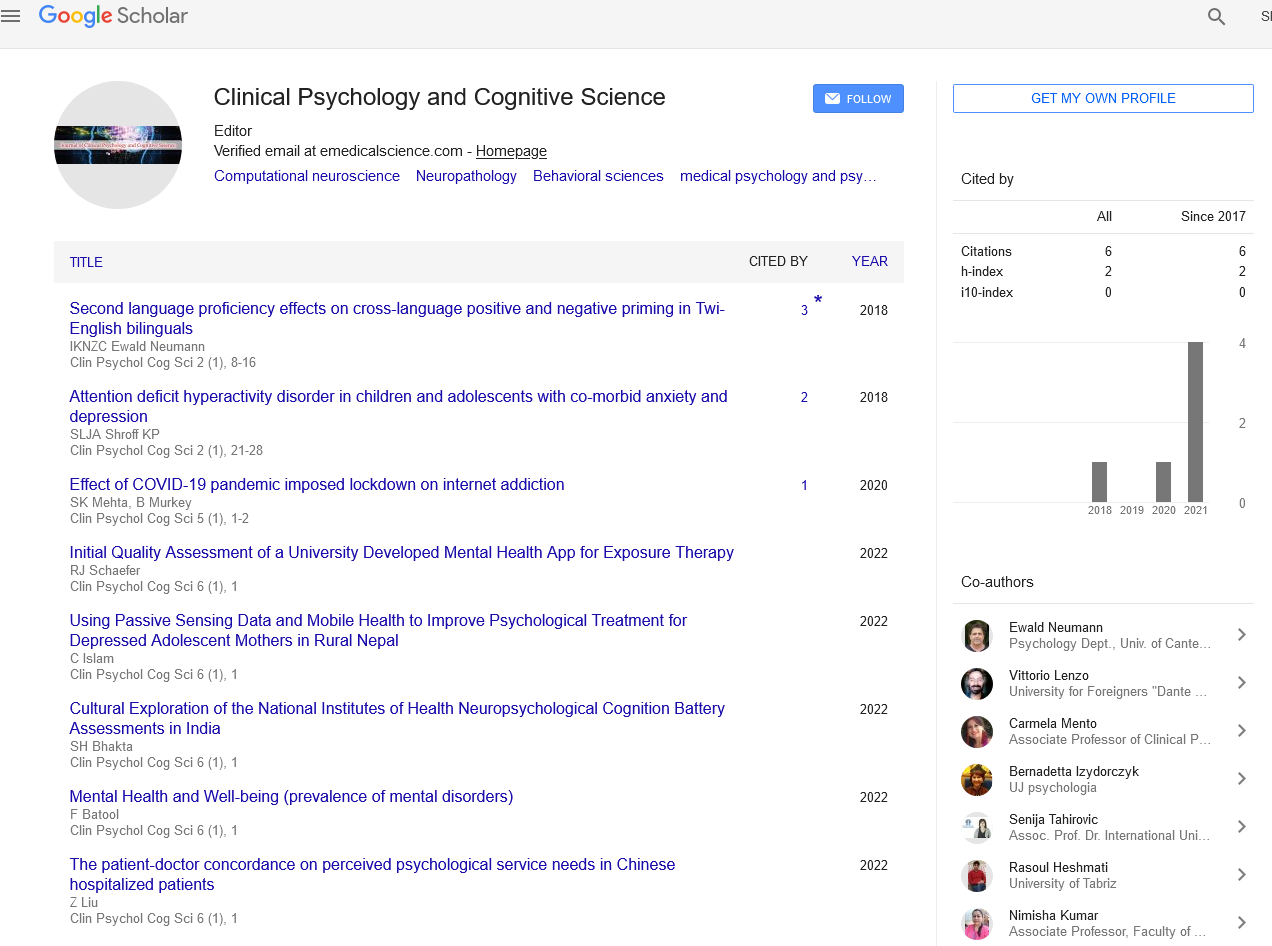Psychoanalysis, hope, and severe mental illness: A reply to Ver Eecke
Received: 21-Mar-2023, Manuscript No. PULJCPCS-23-6243; Editor assigned: 23-Mar-2023, Pre QC No. PULJCPCS-23-6243 (PQ); Reviewed: 06-Apr-2023 QC No. PULJCPCS-23-6243; Revised: 22-May-2023, Manuscript No. PULJCPCS-23-6243 (R); Published: 29-May-2023
Citation: Earl J. Psychoanalysis, hope, and severe mental illness: A reply to Ver Eecke. J Clin Psychol Cogn Sci 2023;7(1):1.
This open-access article is distributed under the terms of the Creative Commons Attribution Non-Commercial License (CC BY-NC) (http://creativecommons.org/licenses/by-nc/4.0/), which permits reuse, distribution and reproduction of the article, provided that the original work is properly cited and the reuse is restricted to noncommercial purposes. For commercial reuse, contact reprints@pulsus.com
Abstract
In his article "hope for persons afflicted with severe mental illnesses: Crucial ideas," Ver Eecke discusses the importance of hope in the treatment of severe mental illnesses. Ver Eecke argues that hope is crucial for individuals with mental illnesses, especially severe ones, as it helps them to persevere through treatment and achieve a better quality of life. The article defines hope as an active belief in the possibility of a positive outcome despite the difficulties faced. The author identifies three key ideas that are essential in cultivating hope in individuals with severe mental illnesses: Establishing a therapeutic alliance, identifying and strengthening internal resources, and setting achievable goals. The article emphasizes that fostering hope in individuals with severe mental illnesses is not a one size fits all approach and that clinicians must tailor their treatment to meet the unique needs of each individual. The importance of hope in mental health recovery cannot be overstated, and clinicians must prioritize fostering hope in their patients. By doing so, individuals with severe mental illnesses can persevere through treatment and achieve a better quality of life.
Keywords
Crucial ideas; Severe ones; Patients; Therapeutic alliance; Internal resources
Introduction
The article “hope for persons afflicted with severe mental illnesses: Crucial ideas” by Ver Eecke addresses the crucial concept of hope in the treatment of severe mental illnesses. Ver Eecke argues that hope is essential for individuals with mental illnesses, especially severe ones, as it helps them to persevere through treatment and achieve a better quality of life. This essay will provide an overview of the article, examine the concept of hope, and discuss the importance of hope in the treatment of severe mental illnesses [1].
The article begins by highlighting the challenges faced by individuals with severe mental illnesses. These challenges include social isolation, stigma, lack of access to healthcare, and the inability to lead a fulfilling life. Ver Eecke argues that these challenges can make individuals feel hopeless, leading to a lack of motivation to seek treatment or engage in self-care activities. However, he emphasizes that hope is a powerful antidote to this sense of hopelessness [2].
The author defines hope as a belief in the possibility of a positive outcome despite the difficulties faced. It is not a passive feeling but an active one that involves taking action towards achieving a better future. Hope is a complex and multifaceted concept, but it is a vital aspect of mental health recovery. The article suggests that clinicians should prioritize fostering hope in their patients, especially those with severe mental illnesses [3].
Description
Ver Eecke identifies three key ideas that are essential in cultivating hope in individuals with severe mental illnesses. Firstly, the clinician must establish a therapeutic alliance with their patients. This alliance involves building a trusting relationship, understanding the patient's unique experiences and needs, and working collaboratively towards shared goals. Secondly, clinicians must help patients to identify and strengthen their internal resources, such as their resilience and coping skills. Finally, clinicians must encourage patients to set achievable goals and work towards them in a step by step manner. These goals can include both short term and long term goals, and they should be tailored to the individual's interests and values [4-6].
The article emphasizes that fostering hope in individuals with severe mental illnesses is not a one size fits all approach. Each individual has unique experiences and needs, and clinicians must tailor their treatment to meet those needs. Moreover, hope should not be viewed as a cure all but rather as a key aspect of a comprehensive treatment plan [7,8].
Conclusion
Ver Eecke's article highlights the importance of hope in the treatment of severe mental illnesses. Hope is a complex and multifaceted concept that involves actively taking steps towards achieving a better future. Clinicians must prioritize fostering hope in their patients, and this can be achieved through establishing a therapeutic alliance, identifying and strengthening internal resources, and setting achievable goals. By doing so, individuals with severe mental illnesses can persevere through treatment and achieve a better quality of life.
References
- Ver Eecke W. Hope for persons afflicted with severe mental illnesses: Crucial ideas. Clin Psychol Cog Sci. 2021;5(3):1-2.
- Ver Eecke W. Schreber and Holderlin: The concept of “a father” or the psychological origin of mental breakdown. J Am Acad Psychoanal. 1995;23:449-60.
[Crossref] [Google Scholar] [PubMed]
- Gibbs PL. The primacy of psychoanalytic intervention in recovery from the psychoses and schizophrenias. J Am Acad Psychoanal Dyn Psychiatry. 2007;35:287-12.
[Crossref] [Google Scholar] [PubMed]
- Tillman JG. A view from riggs: Treatment resistance and patient authority-IX. Integrative psychodynamic treatment of psychotic disorders. J Am Acad Psychoanal Dyn Psychiatry. 2008;36(4):739-61.
[Crossref] [Google Scholar] [PubMed]
- Silver AL. Psychoanalysis and psychosis: Players and history in the United States. Psychoanal Hist. 2002;4(1):45-66.
- Kochiras H. Freud saidor Simon says? Informed consent and the advancement of psychoanalysis as a science. Med Health Care Philos. 2006;9:227-41.
[Crossref] [Google Scholar] [PubMed]
- Kirshner LA. The concept of the self in psychoanalytic theory and its philosophical foundations. J Am Psychoanal Assoc. 1991;39(1):157-82.
[Crossref] [Google Scholar] [PubMed]
- Lothane Z. The partnership of psychoanalysis and psychiatry in the treatment of psychosis and borderline states: Its evolution in North America. J Am Acad Psychoanal Dyn Psychiatry. 2011;39(3):499-523.
[Crossref] [Google Scholar] [PubMed]





